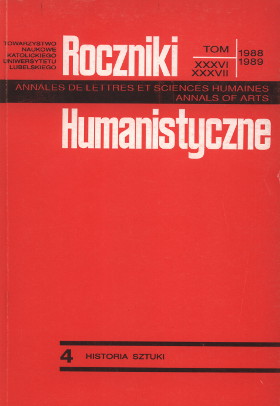Stanisław Lack − „The First Hierophant of Wyspiański”
Abstract
The article discusses the standpoints of Stanisław Lack (1876-1909) − a literary and artistic critic of Young Poland, Stanisław Wyspiański’s friend, a great lover of his literary and artistic output, and at the same time one of his first exegetes. Lack was the author of numerous articles in such papers as „Krytyka” (Critique), „Nowe Słowo” (New Word), „Pamiętnik Literacki” (Literary Diary), „Życie” (Life). The majority of texts which concerned Wyspiański were published posthumously, prepared by Stanisław Pazurkiewicz as: S. Lack, Studies on Stanisław Wyspiański, Częstochowa 1924.
The subject-matter of the present study is an analysis of Lack’s articles, first of all those which were published in the columns of „social, learned and literary” monthly entitled „Krytyka” (Critique), edited in the period of 1900-1914 in Cracow by Wilhelm Feldman.
Speaking most generally, that which particularly interested Lack was the question of the artist’s attitude to the past of his own fatherland. It is well understood then that he chose Wyspiański who struggled incessantly with this problem. The premiere of his drama Wesele (The Wedding) in 1901, as it were, split up the period of Young Poland into two phases: the earlier one − which was formalistic and aesthetizing and concerned programme, the later one − engaged. Lack claimed that Wyspiański was the only Polish artist who was able to save his own individuality, being at the same time, also in view of art, well aware of the demands laid down by the present.
As a work of art was supposed to be, according to Lack, a link between the present and the past, so criticism was supposed to link a work with its recipient. The role of a critic was to consist in accompanying the artist in an intellectual manner in his creative process with the view of that the recipient of the artist’s work would not have to grope in the darkness. Criticism then should be subordinate to the work of art. Not completely, though; a critic is also a recipient, so he has a right to his own way of perceiving and analyzing a work of art. In view of that Lack drew his practice up to the limits of possibility more or less consciously realizing Wilde’s conception of criticism as art.
Lack was one of the most original critics of Young Poland period. Despite that his texts were many times incommunicative, they should be valued highly in view of the problems they discussed and the original manner (he created his own language of expression) in which he did it.
Copyright (c) 1989 Roczniki Humanistyczne

This work is licensed under a Creative Commons Attribution-NonCommercial-NoDerivatives 4.0 International License.





